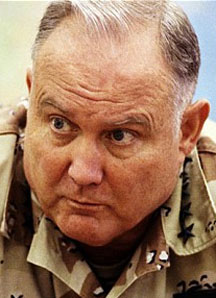WASHINGTON, (Reuters) – Norman Schwarzkopf Jr., the hard-charging U.S. Army general whose forces smashed the Iraqi army in the 1991 Gulf War, has died at the age of 78, a U.S. official said yesterday.
The highly decorated four-star general died at 2:22 p.m. EST (1922 GMT) at his home in Tampa, Florida, said the official, who spoke on condition of anonymity. The cause of death was not immediately known.
Schwarzkopf, a burly Vietnam War veteran known to his troops as Stormin’ Norman, commanded more than 540,000 U.S. troops and 200,000 allied forces in a six-week war that routed Iraqi leader Saddam Hussein’s army from Kuwait in 1991, capping his 34-year military career.
Some experts hailed Schwarzkopf’s plan to trick and outflank Hussein’s forces with a sweeping armored movement as one of the great accomplishments in military history. The maneuver ended the ground war in only 100 hours.

Former U.S. President George H.W. Bush, who built the international coalition against Iraq after the invasion of Kuwait, said he and his wife “mourn the loss of a true American patriot and one of the great military leaders of his generation,” according to a statement released by his spokesman.
Bush has been hospitalized in Houston since late November.
In a statement, the White House called Schwarzkopf “an American original” whose “legacy will endure in a nation that is more secure because of his patriotic service.”
Schwarzkopf was a familiar sight on international television during the war, clad in camouflage fatigues and a cap. He conducted fast-paced briefings and reviewed his troops with a purposeful stride and a physical presence of the sort that clears bar rooms.
Little known before Iraqi forces invaded neighboring Kuwait,
Schwarzkopf made a splash with quotable comments. At one briefing he addressed Saddam’s military reputation.
“As far as Saddam Hussein being a great military strategist,” he said, “he is neither a strategist, nor is he schooled in the operational arts, nor is he a tactician, nor is he a general, nor is he a soldier. Other than that, he’s a great military man, I want you to know that.”
Schwarzkopf returned from the war a hero and there was talk of him running for public office. Instead, he wrote an autobiography – “It Doesn’t Take a Hero” – and served as a military analyst.
He also acted as a spokesman for the fight against prostate cancer, with which he was diagnosed in 1993.
Schwarzkopf was born Aug. 22, 1934, in Trenton, New Jersey, the son of Colonel H. Norman Schwarzkopf Sr., the head of the New Jersey State Police. At the time, the older Schwarzkopf was leading the investigation of the kidnapping and murder of aviator Charles Lindbergh’s infant son, one of the most infamous crimes of the 20th century.
The younger Schwarzkopf graduated from the U.S. Military Academy at West Point, New York, in 1956. He earned a masters degree in guided-missile engineering from the University of Southern California and later taught engineering at West Point.
Schwarzkopf saw combat twice – in Vietnam and Grenada – in a career that included command of units from platoon to theater size, training as a paratrooper and stints at Army staff colleges.




